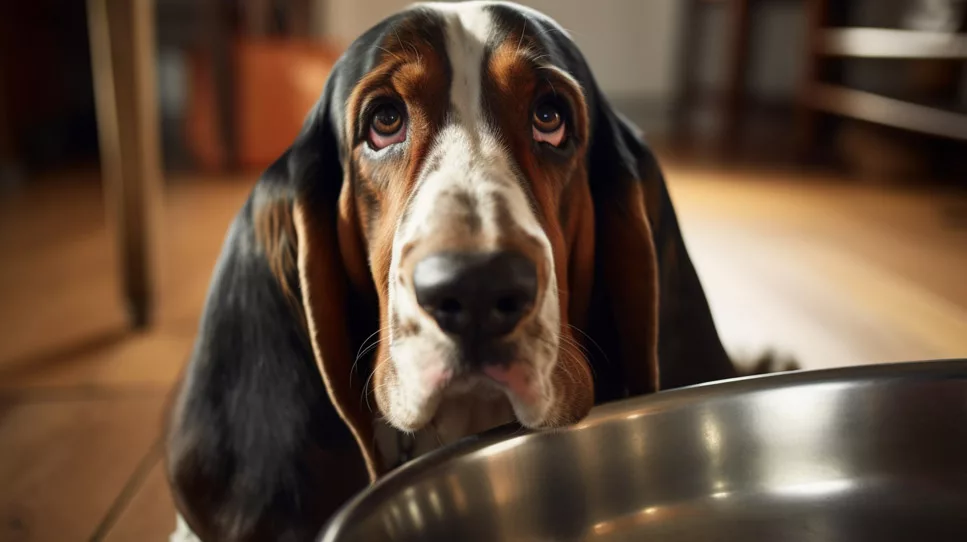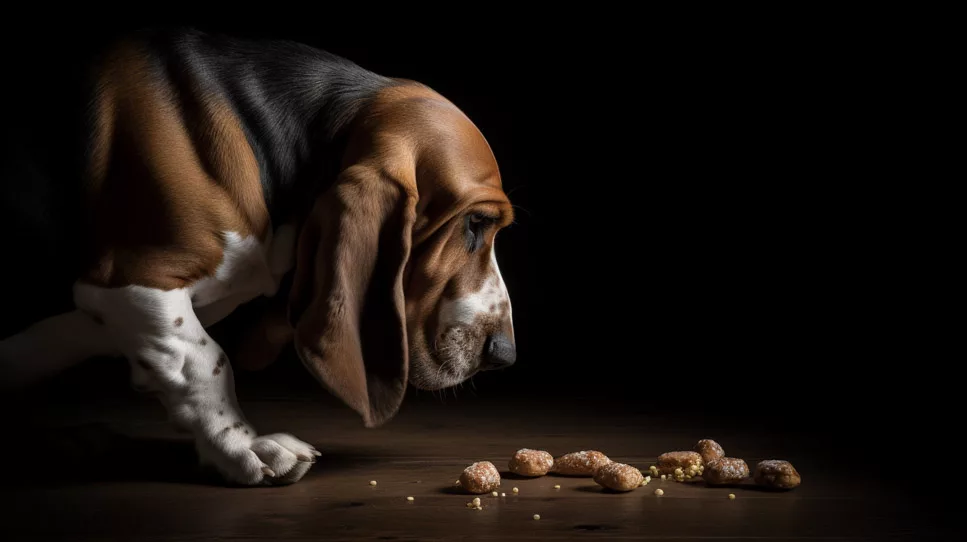
Becoming a Basset Hound parent sets you on a path of unique adventures and responsibilities. One significant area you’ll want to master is their diet, ensuring it’s rich in necessary nutrients. This guide aims to illuminate the various aspects of a Basset Hound diet, bringing clarity on suitable food choices, feeding schedules, and specific dietary needs to create a thriving environment for your hound.
Decoding the Intricacies of a Basset Hound Diet
To truly grasp the concept of a Basset Hound diet, one must navigate through the particulars such as their specific caloric requirements, the optimal nutrient distribution, and the dietary peculiarities that this breed exhibits.
Determining Caloric Intake for Basset Hounds
While a ballpark figure for an adult Basset Hound’s daily caloric intake ranges between 1200 to 1500 calories, individual needs can differ. Factors like age, weight, activity level, and overall health determine the number of calories your Basset Hound should consume. A sedentary, older Basset Hound will require fewer calories compared to a young, active one. Engaging with your vet can help you pinpoint the ideal caloric intake for your hound, ensuring they receive the energy they need without tipping into unhealthy weight gain.
Balancing Nutrients: Proteins, Fats, and Carbs
The cornerstone of a balanced Basset Hound diet lies in an optimal mix of proteins, fats, and carbohydrates. Proteins, sourced from high-quality meats or plant-based foods, are essential for muscle growth and repair, promoting strong, healthy bodies. Fats, preferably from animal sources or specific plant oils, provide concentrated energy, aiding in vitamin absorption while promoting healthy skin and coats. Carbohydrates, though necessary in smaller quantities, should come from digestible sources to ensure a healthy gut, providing dietary fiber and usable energy.
Choosing the Perfect Food for Your Basset Hound
The dog food market presents a vast array of choices, each with its unique pros and cons. This section aims to make your choice less daunting by discussing the different types of dog food, ingredients to look for, and other things to consider when deciding on your Basset Hound’s diet.
Weighing the Pros and Cons: Commercial Dog Food vs. Homemade Meals
Commercial dog food offers convenience, delivering balanced nutrition in a bag or can. Manufacturers meticulously create these foods to meet a dog’s nutritional needs. However, the downside is a lack of control over ingredient quality and potential additives. Homemade meals, on the other hand, give you full control over what goes into your Basset Hound’s food, including quality, quantity, and variety. However, striking a nutritional balance can be tricky, demanding a lot of time and research. Both choices have their merits and downfalls, but the key is to ensure your Basset Hound receives all the necessary nutrients.
Scanning for Quality Ingredients in Commercial Dog Food
Choosing commercial dog food requires careful label reading. Real meat (like chicken, beef, or fish) should be the first ingredient listed, indicating it’s the primary ingredient by weight. Avoid products containing meat by-products, unnamed meat sources, artificial colors, or preservatives. Also, steer clear of foods with an overabundance of grains, which can be a sign of filler ingredients. A high-quality dog food will boast a balance of proteins, fats, and carbohydrates, coupled with necessary vitamins and minerals.
Guiding Principles for Feeding Your Basset Hound
After deciding on the ‘what’ of feeding your Basset Hound, understanding the ‘how’ is crucial. Every life stage, from puppyhood to senior years, presents unique nutritional demands. Let’s delve into feeding guidelines to ensure your hound gets the most from their meals.
Catering to the Needs of a Basset Hound Puppy
Basset Hound puppies are tiny bundles of joy with an energy level that can surprise you. Although their stomachs are smaller, their bodies are growing rapidly, demanding high-energy, nutrient-dense food. High-quality puppy food, designed to meet these demands, is recommended for this life stage. Consider feeding your puppy small, frequent meals to avoid overwhelming their tiny stomachs while meeting their energy needs.
Navigating through an Adult Basset Hound’s Diet
As Basset Hounds transition into adulthood, their dietary needs change. They no longer need the high energy diets of their puppyhood and should transition to two balanced meals a day. This approach helps reduce the risk of bloat, a serious condition to which deep-chested breeds like Bassets are prone. Keep their diet balanced and varied, and always remember that treats and extras also contribute to their daily caloric intake.
Health Implications and the Influence of Diet
Like other breeds, Basset Hounds have certain health predispositions. A well-planned diet can manage, if not entirely avoid, these health issues. Let’s examine these concerns and how diet can be a powerful tool in your Basset Hound’s health management.
Warding off Obesity in Basset Hounds
Basset Hounds are infamous for their propensity towards obesity, which can lead to serious health complications like joint issues and heart disease. To maintain a healthy weight, your Basset Hound needs a balanced diet, regular exercise, and careful portion control. Overfeeding, even with high-quality food, can lead to weight gain. Regular vet check-ups can help monitor your hound’s weight, adjusting diet and exercise routines as needed.
Alleviating Joint Problems with Omega-3s
Basset Hounds are susceptible to joint problems, primarily due to their unique body structure. Their short legs and long bodies put additional stress on their joints, making them prone to conditions like hip dysplasia. Omega-3 fatty acids, found in fish and flaxseed oils, can be a beneficial addition to their diet. These fatty acids improve joint health and alleviate inflammation, promoting a more comfortable and active life for your hound.
Basset Hound Diet: Frequently Asked Questions
Inevitably, discussions on a Basset Hound diet stir up numerous questions. Addressing some of the most common queries can provide a clearer understanding and pave the way for a healthier Basset Hound.
What is the Ideal Feeding Frequency for My Basset Hound?
For an adult Basset Hound, two meals a day, spaced evenly, are ideal. This frequency aligns with their digestion cycle, helping prevent conditions like bloat. However, puppies have different demands. Due to their higher energy needs, Basset Hound puppies benefit from more frequent, smaller meals throughout the day.
Is a Raw Food Diet Suitable for My Basset Hound?
Raw food diets, while gaining popularity, can be a double-edged sword. They offerfreshness and the potential to control ingredient quality, but they also come with risks like bacterial contamination and nutritional imbalances. Making a radical shift like this should always be done in consultation with a veterinarian, considering your dog’s unique health profile and dietary needs.
Are There Foods I Should Avoid in a Basset Hound’s Diet?
Absolutely. Certain foods, such as chocolate, grapes, onions, garlic, and artificial sweeteners like xylitol, can be toxic to dogs, including Basset Hounds, and should be avoided. Some other foods, while not toxic, can cause digestive upset or allergic reactions. Always introduce new foods gradually and watch for adverse reactions.
Can My Basset Hound Be a Vegetarian?
While it’s possible for a dog to survive on a plant-based diet, it’s much harder to ensure they get all the necessary nutrients they need for optimal health. Dogs, including Basset Hounds, are primarily carnivorous, meaning they thrive on a diet rich in animal proteins. If you’re considering a vegetarian diet for your Basset Hound, it’s imperative to consult with a vet or a pet nutritionist to plan a diet that meets all their nutritional needs.
In Summary
As Basset Hound parents, our prime objective is their health and happiness. Understanding the nuances of a suitable Basset Hound diet is a fundamental part of this journey. Through mindful decisions about food choices, feeding schedules, and dietary needs, we can contribute significantly to our hound’s well-being. The key takeaway is to consider the unique needs of your Basset Hound, pair it with expert advice, and you’re on the right path to ensuring a vibrant, healthy life for your four-legged friend!
Wellness Core Natural Grain Food
Wellness Core Natural Grain is a solid selection for your hound if you’re looking for something that is wheat free.
The advantage of wheat free is that it can help improve some dietary conditions with your basset, so if you find that your dog has been having some problems, it ‘s well worth looking into a food such as this.
In addition, the high protein content promotes growth. We like this as it’s packed with nutrients and there’s a lot of options available when buying online.
Purina One Smartblend
We go for the chicken based one, our basset reports that it is delicious. Well, she doesn’t report, but she gets through enough of it to suggest it.
We like the quality that is on offer from the Purina SmartBlend from the consistency to the nutrients that are on offer here.
It goes nicely with a wet food and has a good balance of the required proteins for a growing hound.
Blue Wilderness High Protein Grain Free Adult Dog Food
This is a good blend of food that features bits that contain a prescribed blend of vitamins that an adult dog will need to stay in full working order.
Blue Wilderness is another grain free brand with high quality ingredients and no by-products, meaning there’s some high quality proteins involved.
Take into consideration the weight of your basset when measuring out this dry food.
Outward Hound Fun Feeder Slow Feed Interactive Bloat Stop Dog Bowl
If you find that your basset is wolfing down his or her food all the time, a bowl such as this one is highly recommended.
Eating food too fast can lead to some health issues along the line such as bloat.
These bowls make your hound take their time while eating and ensure that meals are both fulfilling and fun at the same time.





